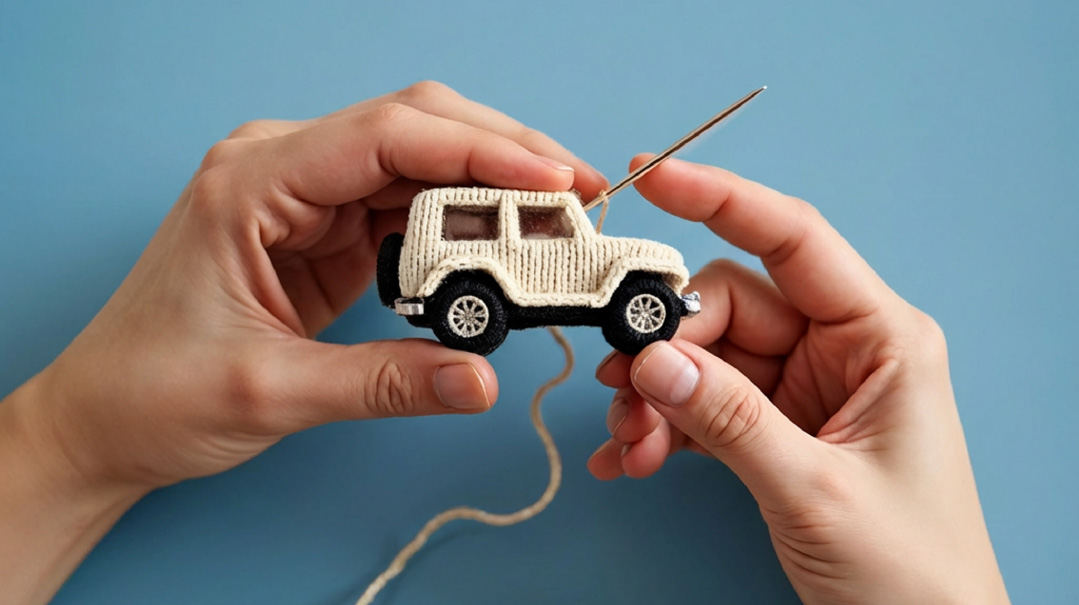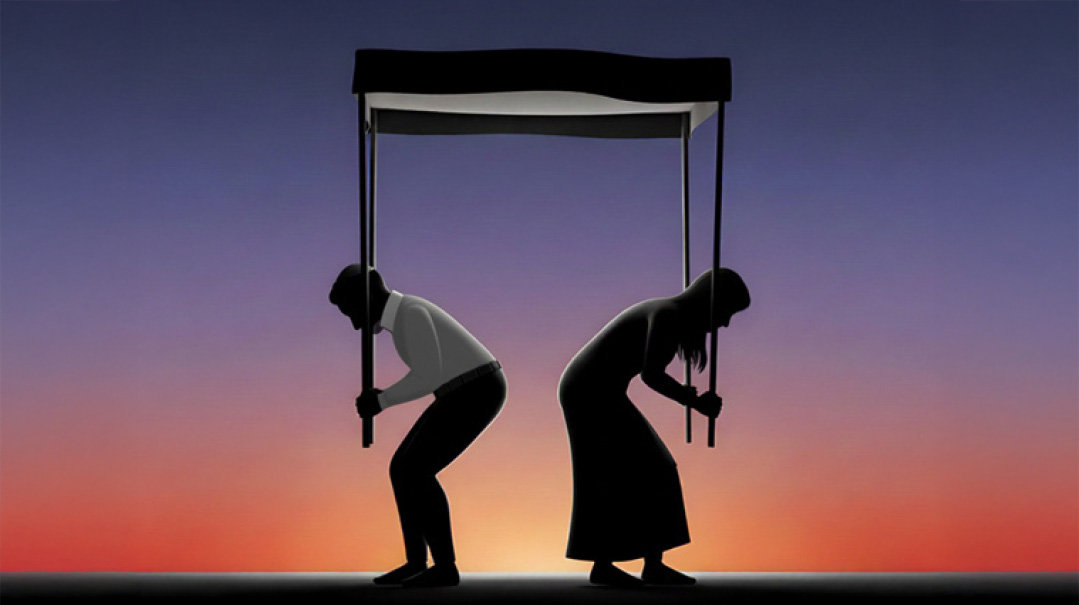Wish You Knew

“There is no mortal way out of this; we need Hashem to carry us through”
E
ver since the IDF’s surprise attack on Iran, the residents of Eretz Yisrael have been living a high-alert existence. High-alert doesn’t mean a lockdown or constant emergency. It’s a strange state where life proceeds in some fashion, minus some big chunks of the usual “normal” (if normal can be said to exist in a land so spiritually sensitive to our every deed and misdeed).
In this altered reality, there is a constant awareness that we’re living in the crosshairs — and constant appreciation and gratitude for many outright miracles. Maybe that’s why the intangible cable linking our apartments in the Mideast to our families across the world seems taut right now. In some ways we feel closer than ever before — the phone calls, emails, and messages of concern and caring keep coming. But in some ways we feel very far.
I asked a few friends and workmates — all of them privileged to live in a land rocked by fear yet caressed by miracles — to help tease out what is it, really, that we wish our families and friends across the ocean would know.
1
Different Planets
“I think it’s nice when people reach out to just let us know that they’re thinking of us,” one friend said. But, a few others pointed out, there’s no way we can really explain what it’s like. It’s not geography or the time difference that separates us. It’s the fact that we live in a different reality.
Every Jew everywhere lives with the knowledge that nothing is assured, that Hashem holds their fate in His Hand. But we’ve been forced to cultivate that knowledge from a vague understanding to an almost physical crutch. As much as we try to keep to old routines or set up new ones, the underlying mode is uncertainty. The only stable entity is His Will.
In many ways, our shuttered offices, improvised weddings, and school closures — with their accompanying round-the-clock calls of, “I’m hungry, what’s there to eat” — feel reminiscent of Covid. But during Covid, the entire world came to a halt. Everyone, no matter where, was groping for stability, for connection, for ideas to entertain the kids while getting some work done. Now the rest of the world is running as usual — graduations, camp lists, politics — and it’s just us in this embattled little country trying to keep up.
It’s no one’s fault, but it can feel alienating to exist on such a distant planet. (Which makes me wonder: That friend whose child will never speak or eat on his own, or the cousin whose husband suffers from depression — she’s also isolated in her own lonely lane, surrounded by people who will never fathom what it takes to keep showing up and smiling. Is this how she always feels?)
2
Help Wanted (if it’s the right type)
My unofficial focus group all said the same thing. We appreciate everyone’s concern. We feel real warmth and connection when you check in.
That said, some comments make us feel slightly like freaks (“Oh-em-gee I can’t imaaaaagine how you are getting through the day, it sounds insaaaane”) or cynical (“Not sure how I’ll manage that week between school and camp, all the kids will be home kvetching”) or judged (“Wait, you live in an apartment without a safe room?”) or force us to put on a show of bravado we don’t always feel (“Aren’t you scared to be bringing up your kids in this craziness?”).
If relatives want to help, a few people mentioned that sponsoring a new toy or game is a very welcome gesture. (Craft ideas, on the other hand, are not. “I have crafting PTSD,” one woman told me. “Send your craft ideas to someone who didn’t do Covid.”)
3
Big vs. Little
We know we’re living through something cosmic — since October 7 our bitachon muscles have been getting a constant workout. And we lean on that newfound fitness for the Big Things, the existential challenges like approaching missiles, nuclear threats, collapsed buildings. But often it’s hard to find the spiritual resources for the pettier challenges: the kids home with no structure, the limited milk available in the stores, the canceled flights and visits.
I once read that humans cope better with big, dramatic crises than chronic, grinding instability. And my unofficial poll seemed to corroborate that. “The ballistic missiles falling, which the rabbanim are offering so much chizuk about, is not what’s making me feel like I’m losing it,” one friend put it. “It’s my kids (including one with special needs) being home from school for so long, trying to entertain them while getting work done, facing day after day without structure or support.”
We know that big people are formed by their little challenges. That our behavior in the four walls of our homes says more about us than our performance at work or at shul. Maybe that’s why this part of the challenge feels so daunting — because it really is that significant.
4
Hour by Hour
Last Thursday I got a phone call from the orthodontist: “We want to confirm your son’s appointment tomorrow.” To my surprise, when I arrived the next day, the waiting room was full. This dental clinic is located in an outdoor mall (with access to shelters), and I was amazed and moved to see the streams of people — shopping for Shabbos, soaking up the sunshine, reveling in just being alive. There was even a man who’d tied a hefty watermelon to his motorized wheelchair; Iranian ire aside, he wasn’t ready to forgo his family’s Shabbos afternoon treat.
Apparently in this gritty country where murderous missiles are all in a day’s news, accountants are still filing taxes, construction workers are drilling and banging, and a remarkable number of businesses have rebranded overnight with creative wartime copywriting. (Missiles getting you down? Try our massage clinic to lift your spirits! Or Keep Safe, Keep Saving! Shop 30 percent off, shelter on premises.)
It probably sounds bizarre to anyone not in it. But honestly, no one’s hunkering down in a bunker 24/7. We’re trying to live vibrant lives in an altered reality — to hold on to whatever structure we can, while maintaining the awareness that everything can and might change in a moment. As we muster our balance against that yawning edge, we know all too well that the most carefully-laid plans can be upended in a moment. But even if we don’t know what tomorrow — or the next minute — may bring, we have this day, this hour, and its very unpredictability makes us all the more determined to seize it.
5
Extra Attuned
As mothers, we always try to be attuned to our children. As mothers of children in this fraught situation, we’re trying to be extra attuned. Every child has a different way of absorbing, processing, and responding to tension. Some children really can’t handle much information. Some hunger for detailed reports of every development. Some are probably qualified at this point to deliver sophisticated military analysis and prognostications on national TV.
In the very same home there may be kids who are desperate for music, friends, and excitement — along with kids who just want a quiet spot on the couch. All will agree that they hate their parents’ extended Zoom meetings — although last week I watched one aspiring eight-year-old sheitelmacher hover in the background of a Zoom screen for close to an hour, styling her amazingly insouciant mother’s wig in a series of braids, waves, and ponytails as the adults just kept talking.
Many children are mourning long-awaited milestones that were snatched away: end-of-the-year performances, class retreats, even yeshivah farhers. Many parents are concerned about reading regression, missing math skills, lost educational momentum. Yes, they’re davening for shalom in the world, in their country — but they’re also desperate for some peace in their homes, an end to the fractiousness and bickering of lots of little people with not enough to do.
It’s draining to contain and address all that.
6
Grateful for the Growth
If you’re following the news from across the ocean, gasping in horror and grief at the devastating destruction and loss of lives, you might be surprised to hear this: Even as they discussed how it feels to live on the brink, every person I spoke to mentioned gratitude.
“I’m deeply grateful to be living through this time with a strong connection to Hashem, and with a real sense of being loved and protected,” one woman said. “I often feel like Rabi Akiva, who laughed when he saw the fox — not because he wasn’t pained by the destruction, but because he saw a deeper meaning and purpose where others saw only despair.”
Maybe there’s an occasional moment here and there when people fantasize of falling asleep and waking up in Monsey or Lakewood or a bungalow in the Catskills — somewhere where they can make plans without calculating shelter availability and distance, somewhere where that edge of fate isn’t hovering so starkly before them. But there is also an overriding sense that we’ve been building up to this moment.
“I’m proud of the way we’ve grown in our emunah since October 7 as a people,” one friend said. “If ballistic missiles would have rained down on us on October 8, I would have fallen apart. But we’ve stretched and grown a lot and come to these big truths since then. These days I feel like we’re living more closely connected to Hashem.
“We may have mouthed it before, we may have thought it, but now we feel it in a very visceral way: There is no mortal way out of this; we need Hashem to carry us through. That closeness itself is a beautiful thing that I would never want to give up.”
(Originally featured in Mishpacha, Issue 1067)
Oops! We could not locate your form.







